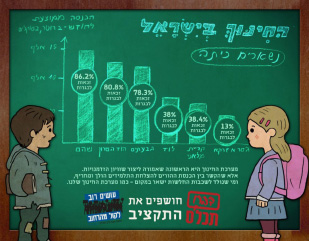A survey commissioned by the Social Budget Forum released January 15th reveals that 87% of Israelis oppose cuts in the state’s health, welfare, and education budgets.
The survey is part of an intensive SHATIL initiative to place socioeconomic issues high on the national agenda, especially during the current election campaign.
SHATIL, together with other key civil society organizations, established the Forum to press for a more socially just 2013 state budget. The Social Budget Forum includes more than 20 organizations, from established groups like Yedid and Rabbis for Human Rights, to groups of activists that emerged from the 2011 summer social justice protests.
“The multi-faceted activities of the Social Budget Forum give citizens the tools to ask the candidates how they will deal with the deficit and what their plans are for the 2013 state budget – and they are doing just that,” says SHATIL Forum Coordinator Odeya Shabtai.
Thanks in part to the initiative, socioeconomic issues have been a major focus of the election campaign. Several parties have publicized detailed budget programs – and budget cuts are again in the spotlight due to an unexpectedly large budget deficit.
The Social Budget Campaign includes meet-the-candidate gatherings with underrepresented populations throughout the country – including a conference in Russian this week; a social media campaign with an active Facebook page, featuring a just-released film clip on the NIS 39 billion deficit, which received more than 500 shares on its first day alone, and an infographic (below) on education, health, employment, the deficit and more.

The campaign also includes “One Action a Day,” which includes: Online campaigns recruiting users to contact one candidate each day to clarify his or her positions on the national budget; op-eds in major media outlets; information sessions/parlor meetings in Jerusalem, Bat Yam, Ashdod, Tel Hai College, and Be’er Sheva; and a High Court of Justice petition, led by Forum member the Movement for Freedom of Information, to force the government to publicize a draft budget after it refused to do so. Forum advocacy specialists also approached leaders of all the major political parties with the request to clearly articulate their budget plans.
The social budget campaign will continue to press for recognition of social needs until the budget of the next government is approved in the spring of 2013.
“We are sowing seeds of hope, and pray that many of them will flourish,” SHATIL Program Director Avi Dabush’s summarized the effort.
